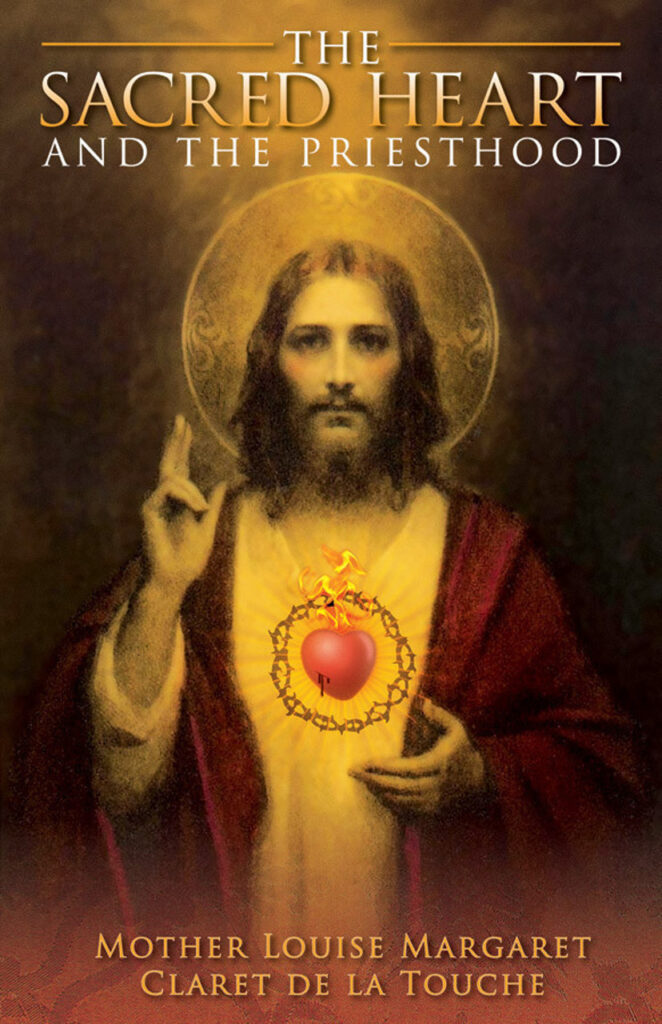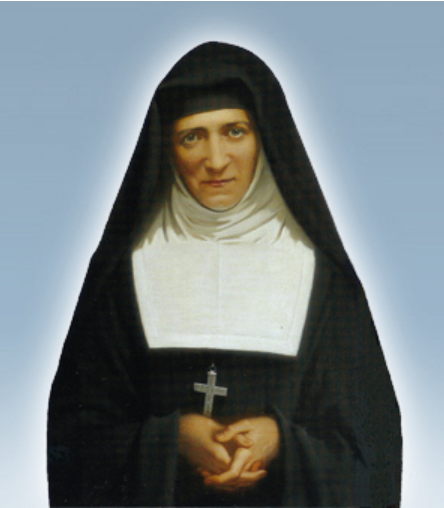The following has been excerpted from The Sacred Heart and the Priesthood by Venerable Louise Margaret Claret de la Touche. Here, Venerable Louise Margaret meditates upon God’s infinite love for man and man’s love for God.
God Is Love
God is love! He loves from eternity to eternity! While Infinite Love, exercising Itself in Itself, takes pleasure in the marvellous communion which goes from the Father to the Son, and from the Son and the Father to the Holy Spirit; in that ineffable communication which the three divine Persons make to each other of the same Love which is their essence and their being; this Infinite Love acts outside Itself also; and as the proper action of love is to love, It loves every creature, every work that has issued from Its powerful word, all that was, all that is, and all that will be.
God loves! That is what He occupies Himself with in the sovereign possession of His Being and in the serene peace of His immortal glory. He loves! That is His life, His action, His pleasure, His divine food and His ineffably sweet repose. He loves! He wishes to love, He must continue to love. His love is Himself, and if He ceased to love, He would suddenly cease to be God.
God is Love! He gives love without reckoning. He pours it out with inexhaustible abundance on the entire creation. Nothing escapes from this divine deluge which strives to engulf everything.
God Wishes To Be Loved
God loves! But He wishes to be loved: love has need of a return. If, in the very bosom of the Divinity, the Father, the Word and the Holy Spirit give such a perfect return that They love each other with the same Love which is their essence, so Infinite Love wishes to find outside of Itself a reciprocity, doubtless relative and proportioned to the weakness of the created being, but nevertheless real.
God pours out torrents of love upon the creature; in his turn, the creature should love. God has deposited in each one, by the fact of its creation, a principle of love, not however in the same degree, or in the same form. In all justice and in all necessity, each creature should love according to its nature and the will of its Creator. It has received everything from God; it ought to give everything back to God; it is what it is only by God; it ought to employ its whole being for God.
Two Movements Of Love
This first love, this necessary love of the creature has, as it were, two movements. The first, a movement of restitution: the creature gives something to God, it returns it to Him. The second is a movement of submission: it accomplishes the will of its Creator.
We see this manner of loving admirably exercised by the inferior creatures. The earth has received its fertility from God, and it is constantly producing for its Creator. The flower has received the brilliancy of its calyx and the sweetness of its perfume; it flowers each spring for its God and it gives Him back its beauty and its fragrant odor. The bird has received its light wings and the sweetness of its song; and it flies, and it sings in the presence of its God. The wild animals that people the deserts have received from their Creator swiftness for running, strength for defense and beautiful covering; and they increase before God, according to the law of their nature, accomplishing the divine will and multiplying according to the good pleasure of their Master. This regular fulfillment of the divine will, and this renewed gift of what they have in themselves is the only way which these inferior creatures have of expressing their love.
But God has formed creatures of a higher order. In them also He has placed the principle of love; and as they have received more from divine munificence, they are bound to give more in return. In their case, God is no longer satisfied with that love of nature and instinct which the inferior beings give Him. As He has endowed them with reason, He expects from them a rational love; as He has given them free will, He expects from them voluntary love; as He has created them according to His image, He expects from them a love like His own.
Man Tends Toward God
God has given man not only that principle of love which He has given to inferior creatures, and by which he was already bound instinctively to tend towards God, and to submit himself to Him, but He has given him much more. He has formed in him a soul endowed with intelligence and free will, and by means of these faculties, man can enter into the knowledge of his Creator and develop in his heart a superior love, a love sovereignly reasonable and truly worthy of God. It is this enlightened love, this voluntary love which man owes to God. Why then does he not give this love to God? Why then is love so little understood by the human heart? I say the true love, the pure love, the supernatural love desired by God, which has descended from Him and which ought to go up again to Him; love, not such as the depraved mind of the fallen creature has conceived it, but as Infinite Love expects from the rational creature; a love finite and created, doubtless, like the creature himself, but enlightened, free and strong.
The Imperfect Love Of Man
Nevertheless, few men love God as He wishes to be loved! Man’s senses, radically impaired by sin, have lost the clear notion of truth. They go astray, they are deceived, they take the wrong road; man has no longer that beautiful luminous intellect, that firm, upright will which he had in the first days of his creation. He is the slave of ignorance and concupiscence. Thus we see him easily turned away from truth, changing the order of things, transforming good into evil, and often preferring evil to good: man’s judgment has no longer its primeval rectitude, it is warped and too often it goes astray. Since his first sin, man has fallen into many errors; but perhaps on no point has he been so much deceived as on love. According as he became detached from God, he became more attached to creatures; and in an attempt to satisfy his heart, which hungered after Infinite Love, he gave it as food this purely earthly attachment and called it “love.”
Man, forgetting God, no longer uniting himself to Him by love, no longer knowing what to believe, not daring to hope for anything, found himself in the midst of the world, like a poor shipwrecked man lost in the ocean. He tried to seize everything that presented itself to him, he attached himself to the smallest floating spar, and clinging to it like a man in desperation, he pressed it to his heart and persuaded himself that he loved it.
But that was not love . . . True love, the only love which deserves this divine name, is that which ascends to God, the only principle of love. Earthly lust, carnal pleasures, are passions unchained by original sin; they are the results of sin. They will never satisfy the intellect and the heart of man; they will never be love!
ooo
This article is taken from a chapter in The Sacred Heart and the Priesthood by Venerable Louise Margaret Claret de la Touche which is available from TAN Books.









